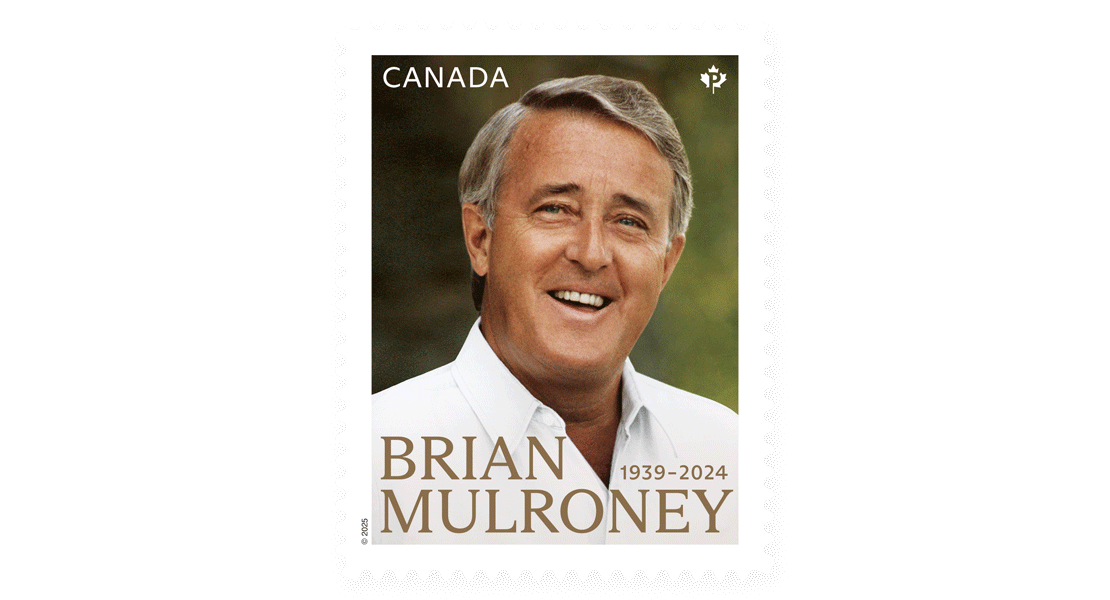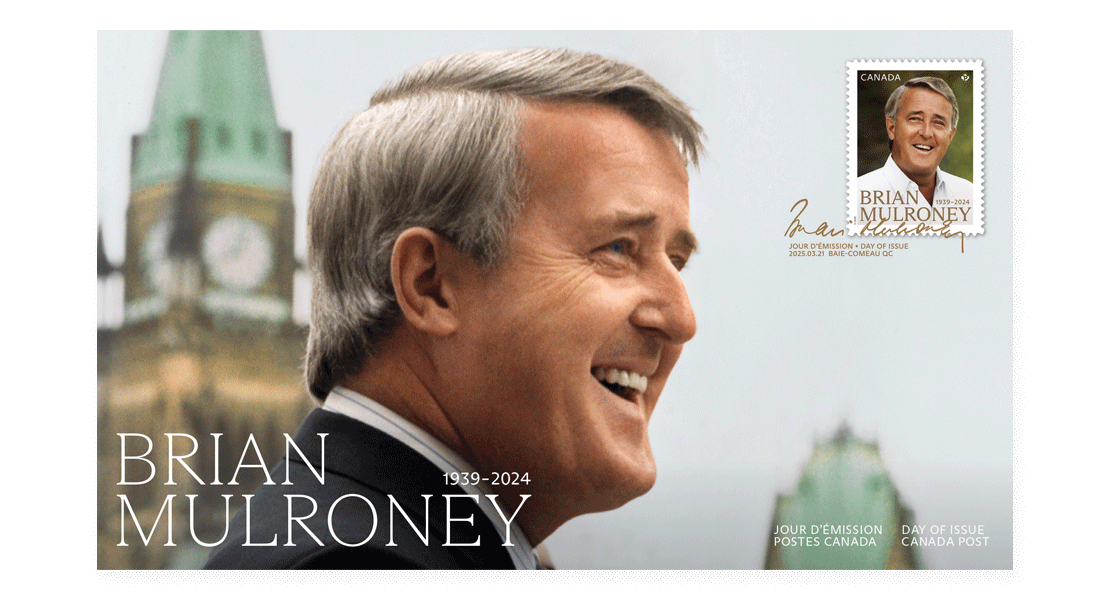Canada Post has issued a new stamp in recognition of Canada’s 18th prime minister, the Right Honourable Martin Brian Mulroney (1939-2024). Born in Baie-Comeau, Quebec, Mulroney is considered one of Canada’s most consequential prime ministers. Mulroney passed away on February 29, 2024, at the age of 84.
This stamp issue continues Canada Post’s long-standing tradition of honouring the accomplishments of former Canadian prime ministers.

Earning the title of The Canadian Press Newsmaker of the Year in 1983, 1984 and 1991, Brian Mulroney – who served from 1984 to 1993 – introduced transformative political, economic and global initiatives throughout his tenure as prime minister. Though some of his initiatives were controversial at the time, many today regard them as key to Canada’s progress.
“You have to have ideas that will benefit Canada in the longer haul,” Mulroney said in a 2013 interview. “Usually, an idea that’s going to do that is unpopular – and as you fight for it, you’ll make yourself unpopular. But your country will benefit in the longer term.”
Video credits: Getty Images, CPAC
The following is a highlight of Mulroney’s political achievements while in office.
Defeated former prime minister Joe Clark to win the party leadership
In 1983, Mulroney ran to be leader of the Progressive Conservatives. He won on the fourth ballot, defeating former prime minister Joe Clark by 259 votes.
Mulroney proved a skillful Leader of the Opposition. Among other issues, he championed closer ties between Canada and the U.S., deregulation, a strong private sector and minority French-language rights.
In a fateful debate ahead of the 1984 federal election, his decisive victory against Liberal leader John Turner – “You had an option, sir.” – would set the stage for his emergence as Canada’s next prime minister.
Won back-to-back majority governments
In the 1984 federal election, Mulroney led the PCs to a momentous victory. Winning 211 seats, the party achieved the largest majority in Canadian history.
Four years later, he won again, making him the first Canadian prime minister since Louis St. Laurent in 1953 to win back-to-back majority governments. He was also the first Conservative to accomplish the feat in over a century.
With free trade at the heart of a heated campaign, the 1988 federal election is considered by many to be one of the country’s most consequential.
Opened up Canada’s economy through free trade
In September 1985, near the beginning of his first term as prime minister, Mulroney announced in the House of Commons his government’s intention to seek a free trade deal with the Americans.
His skill at building and leveraging relationships became key to getting the landmark Canada-United States Free Trade Agreement signed. In October 1987, when negotiations were about to collapse, he famously asked U.S. President Ronald Reagan’s treasury secretary, James Baker, why his country could sign an arms treaty with its greatest enemy – the U.S.S.R. – but couldn’t sign a trade agreement with its closest friend, Canada.
The deal was agreed upon that night and signed on January 2, 1988. It went into effect on January 1, 1989, after Mulroney won his second term.
With the Canada-United States Free Trade Agreement, Mulroney laid the groundwork for the expansion of free trade and was its champion. In 1992, The North American Free Trade Agreement (NAFTA) between Canada, the United States and Mexico was signed.
Passed transformative domestic reforms
Alongside its global efforts, the Mulroney government introduced a wave of major economic reforms.
It introduced a series of tax reforms, including the Goods and Services Tax, which replaced the manufacturer’s sales tax. It also privatized more than 20 Crown corporations, reduced government expenditures and deregulated multiple sectors including the transportation, telecom and energy industries.
Though ultimately unsuccessful, Mulroney’s government fought hard for the Meech Lake Accord, which attempted to bring Quebec into an amended Constitution.
Established himself as Canada’s ‘greenest prime minister’
The environment occupied a prominent role in Mulroney’s agenda. Most notably, he was instrumental in facilitating the historic 1991 Air Quality Agreement – often referred to as the Acid Rain Accord – between the U.S. and Canada.
Among his other achievements, he helped establish the Environmental Protection Act, eight national parks and the 1987 Montreal Protocol, which was an international agreement to protect the ozone layer.
In 2005, a panel of leading environmental advocates named Mulroney the “greenest prime minister in Canadian history.”
Was instrumental in the reunification of Germany
Mulroney came to power in the midst of the Cold War.
A talented international statesman, he was part of a group of global leaders that included U.S. President Ronald Reagan – and later George H. W. Bush – British Prime Minister Margaret Thatcher, Soviet President Mikhail Gorbachev, French President François Mitterrand and German Chancellor Helmut Kohl.
Mulroney and his government played a key role in Germany’s reunification after the fall of the Berlin Wall on November 9, 1989.
In 1993, Chancellor Kohl told a committee of the German Reichstag that there were three world leaders to thank for German reunification: George H. W. Bush, Mikhail Gorbachev, and Brian Mulroney.
Contributed to the dismantling of South African apartheid
When it came to South Africa, Mulroney was outspoken in his opposition to apartheid, which set him apart from his international counterparts, including President Reagan and Prime Minister Thatcher.
At a bold speech before the United Nations he declared, “If there is no progress in the dismantling of apartheid, our relations with South Africa may have to be severed completely.”
Mulroney’s unequivocal support is recognized in contributing to the dismantling of apartheid, leading to Nelson Mandela’s freedom. After his release, Mandela publicly thanked Canada for its efforts. In 2015, South Africa awarded Mulroney the Order of the Companions of O.R. Tambo for his “exceptional contribution to the liberation movement of South Africa.”
Accolades and awards
Since leaving office in 1993 after having served as Prime Minister for almost nine years, Mulroney received numerous awards and accolades in recognition of his impact.
These include:
- Companion of the Order of Canada (1998)
- Grand Officer of the Ordre national du Québec (2002)
- Woodrow Wilson Award for Public Service (2003)
- Named Canada’s “most admired” former prime minister in a 2009 survey by The Hill Times
- George Bush Award for Excellence in Public Service (2018)
- James A. Baker III Prize for Excellence in Leadership (2019)
In 2019, Paul Deegan wrote in the Toronto Star that Mulroney was “our greatest statesman prime minister” who “moved our country forward with purposeful conviction during uncertain times.”

Stamp honours life and legacy of Canada’s 18th prime minister, the Right Honourable Brian Mulroney
Available now